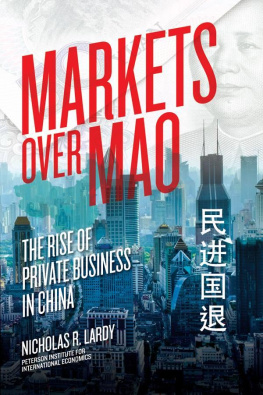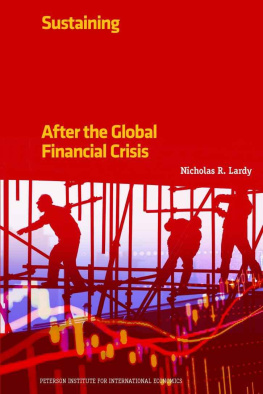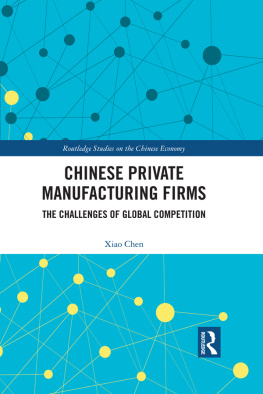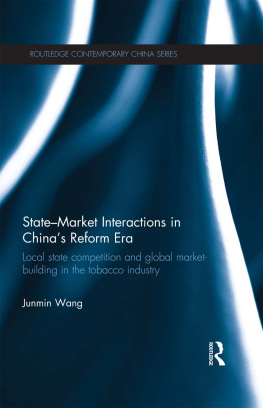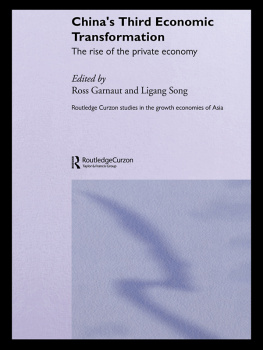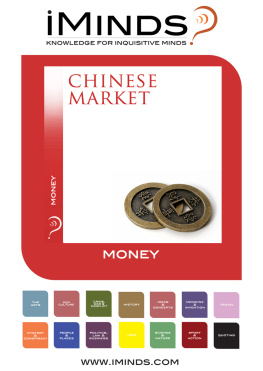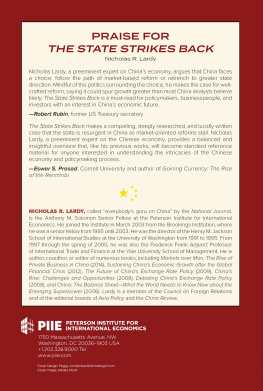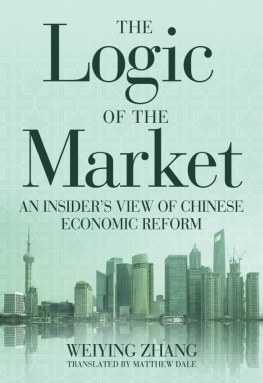Everyone thinks China is different, and in many respects it is. However in this important book, Americas preeminent watcher of Chinas economy, Nick Lardy, makes a compelling case that the market has mattered more than the direction of the state for Chinas success. Everyone concerned with the future of China in the global economy should carefully consider Lardys thesis.
Lawrence H. Summers, Charles W. Eliot University Professor at Harvard University,
former US Treasury Secretary and Director of the National Economic Council
For three decades, Nick Lardy has consistently recognized the cutting edge changes in Chinas economy. He has done it again. At a time when the new conventional wisdom is that the Chinese dragon is deploying state capitalism to challenge the international market economy, Lardy has mined the data to discover Chinas real driving engine: its private sector. The Chinese private sector is now the dominant creator of growth, jobs, trade, and return on assets. Chinese private companies are now even the innovative source of foreign direct investment abroad. Lardy concludes by pointing to areasespecially the services sector and a few key administered priceswhere China needs to complete the transition to market competition. Lardys analysis will support the work of Chinas reformers, even as it frustrates the latest Cassandras of capitalism in the West.
Robert B. Zoellick, former World Bank President, US Trade Representative,
and US Deputy Secretary of State
Nick Lardy is one of the worlds leading experts on the Chinese economy. His book makes a deeply researched and rigorously analyzed case that Chinas economy has increasingly relied on market forces to allocate resources, and that privately owned businesses have played a growing and important role in Chinas success. This book is critical reading for anyone trying to gauge Chinas economic prospects and challenges the proposition that Chinas economic performance has been attributable to centralized control of decision making in the economy.
Robert Rubin, cochairman of the Council on Foreign Relations and
former US Treasury Secretary, founder of the Hamilton Project
Markets over Mao turns conventional wisdom on the Chinese economy inside out. Nick Lardys meticulous empirical analysis dispels the popular notion that a creaky state-directed economy is about to collapse. Instead, he paints a compelling picture of the staying power of Chinas market-based dynamism. This book is a must read and a long overdue wake-up call for vast legions of China doubters.
Stephen S. Roach, senior fellow, Yale University Jackson Institute for Global Affairs,
and senior lecturer, Yale School of Management
Nicholas Lardy, one of the worlds leading experts on Chinas economy, challenges the argument frequently made that Chinas high growth rate over the past decade was the result of state-led industrial policy and the increasing role of state enterprises. He shows instead that this economic performance has been the result mainly of market forces and Chinas large and growing private sector and that the reforms announced at the Third Plenum of the Chinese Communist Party in November 2013 indicate that this trend will continue in the future. Specialists on China and nonspecialists simply interested in better understanding the Chinese economy will both gain insights from this book and the careful research that went into producing it.
Dwight H. Perkins, Harold Hitchings Burbank Professor of Political Economy, Harvard University
MARKETS
OVER MAO
THE RISE OF
PRIVATE BUSINESS
IN CHINA

NICHOLAS R. LARDY

Nicholas R. Lardy, called everybodys guru on China by the National Journal, is the Anthony M. Solomon Senior Fellow at the Peterson Institute for International Economics. He joined the Institute in March 2003 from the Brookings Institution, where he was a senior fellow from 1995 until 2003. He was the director of the Henry M. Jackson School of International Studies at the University of Washington from 1991 to 1995. From 1997 through the spring of 2000, he was also the Frederick Frank Adjunct Professor of International Trade and Finance at the Yale University School of Management. He is author, coauthor, or editor of numerous books, including Sustaining Chinas Economic Growth after the Global Financial Crisis (2012), The Future of Chinas Exchange Rate Policy (2009), Chinas Rise: Challenges and Opportunities (2008), Debating Chinas Exchange Rate Policy (2008), and China: The Balance SheetWhat the World Needs to Know Now about the Emerging Superpower (2006). Lardy is a member of the Council on Foreign Relations and of the editorial boards of Asia Policy and the China Review.
PETERSON INSTITUTE FOR INTERNATIONAL ECONOMICS
1750 Massachusetts Avenue, NW
Washington, DC 20036-1903
(202) 328-9000 FAX: (202) 659-3225
www.piie.com
Adam S. Posen, President
Steven R. Weisman, Editorial and Publications Director
Graphics typeset by Kevin A. Wilson, Upper Case Textual Services, Lawrence, Massachusetts
Cover Design by Fuszion
Cover photo by Shansekala, David Franklin
Printing by Versa Press, Inc.
Copyright 2014 by the Peterson Institute for International Economics. All rights reserved. No part of this book may be reproduced or utilized in any form or by any means, electronic or mechanical, including photocopying, recording, or by information storage or retrieval system, without permission from the Institute.
For reprints/permission to photocopy please contact the APS customer service department at Copyright Clearance Center, Inc., 222 Rosewood Drive, Danvers, MA 01923; or email requests to:
Printed in the United States of America
16 15 14 5 4 3 2 1
Library of Congress Cataloging-in-Publication Data
Lardy, Nicholas R.
Markets over Mao : the rise of private business in China / Nicholas R. Lardy.
pages cm
Includes bibliographical references.
ISBN 978-0-88132-693-2
eISBN 978-0-88132-694-9
1. Government business enterprisesChina.
2. PrivatizationChina. 3. ChinaEconomic policy1976-2000. 4. ChinaEconomic conditions1976-2000. I. Title.
HD4319.L37 2014
338.610951dc23
2014011127
This publication has been subjected to a prepublication peer review intended to ensure analytical quality. The views expressed are those of the author. This publication is part of the overall program of the Peterson Institute for International Economics, as endorsed by its Board of Directors, but it does not necessarily reflect the views of individual members of the Board or of the Institutes staff or management.
The Peterson Institute for International Economics is a private, nonprofit institution for the rigorous, intellectually open, and honest study and discussion of international economic policy. Its purpose is to identify and analyze important issues to making globalization beneficial and sustainable for the people of the United States and the world and then to develop and communicate practical new approaches for dealing with them. The Institute is completely nonpartisan. The Institutes work is funded by a highly diverse group of philanthropic foundations, private corporations, and interested individuals, as well as income on its capital fund. About 35 percent of Institute resources in our latest fiscal year were provided by contributors from outside the United States.
Next page
